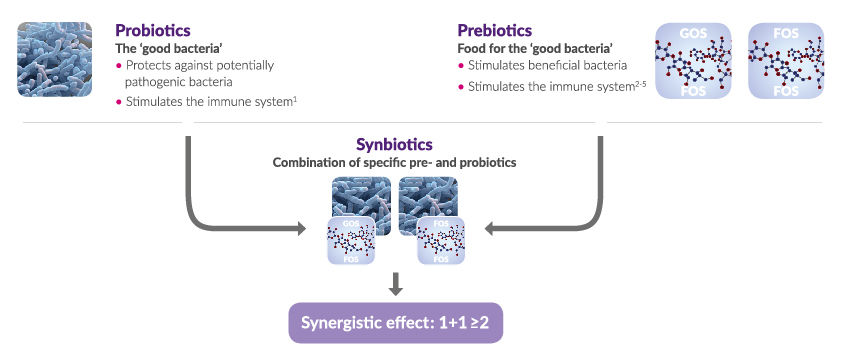Role of nutrition
Nutritional support in early life is an essential part of the clinical management of infants at risk of and with food allergies.

Pre-, pro or synbiotics play an important role in the modulation of the gut microbiota.
A growing amount of clinical evidence shows that pre- and probiotics can have beneficial effects in infants at risk of, or living with food allergies.1–4
Synbiotics are a combination of pre- and probiotics.5 Pre- and probiotics can influence the immune system directly, or indirectly, via the gut microbiota, and therefore they may play a role in preventing the onset of an allergic disease.6 The objective of combining pre- and probiotics is to achieve stronger positive effects than with either component alone (synergy).7
Gut microbiota dysbiosis has been reported in infants with allergic conditions with low levels of bifidobacteria and lactobacilli compared with healthy, breastfed infants.8
Given the presence and important role of these naturally occurring pre- and probiotics, and recognising that breast feeding is not always possible, there is a compelling rationale to combine pre- and probiotic ingredients (synbiotics) in infant formula so that functionally it more closely resembles human breast milk.

- Van der Aa LB, Heymans HS, Van Aalderen WM, Sillevis Smitt JH, Knol J Ben Amor K, Goossens DA, Sprikkelman AB and the Synbad Study Group. Effect of a new synbiotic mixture on atopic dermatitis in infants: a randomized-controlled trial. Clinical & Experimental Allergy, 40, 795–804.
- Van der Aa, et al. Synbiotics prevent asthma-like symptoms in infants with atopic dermatitis. Allergy, 2011;66:170-7.
- Candy et al, A synbiotic containing amino acid-based formula improves gut microbiota in non-IgEmediated allergic infants, Pediatric Research accepted article preview 20 November 2017; doi: 10.1038/pr.2017.270.
- Gibson GR, et al. Dietary modulation of the human colonic microbiota: introducing the concept of prebiotics. J Nutr, 1995 Jun; 125(6): 1401–1412.
- Agostoni C, et al. Complementary feeding: a commentary by the ESPGHAN Committee on Nutrition. J Pediatr Gastroenterol Nutr, 2008; 46(1): 99–110.
- Shamir R, et al. Gut Health in Early Life: Significance of the Gut Microbiota and Nutrition for Development and Future Health. 2015; John Wiley and Son.
- Active management of food allergy: an emerging concept- Anagnostou et al, Arch Dis Child 2015 100(4): 386-90.
Dr Adam Fox: Using EHF and AAF formulas to manage cow's milk allergy
Professor Seppo Salminen: When to recommend synbiotic containing formulas
The role of synbiotics in allergy management
Help us provide information most relevant to you
Please ensure your role and areas of interest are up to date.
